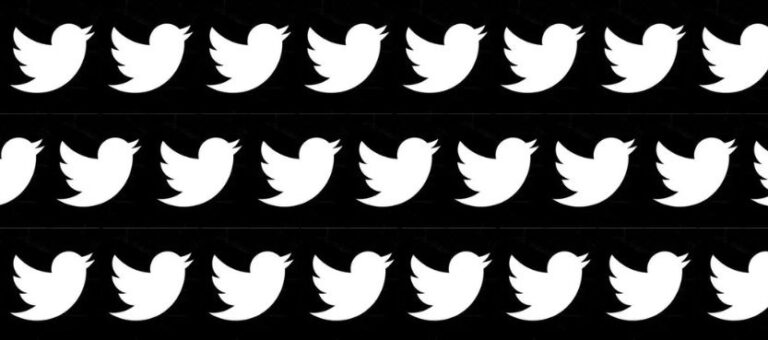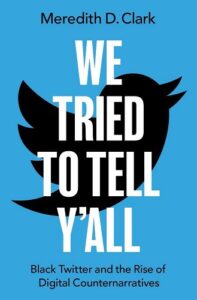Even Elon Musk Can’t Bring Down Black Twitter

The end of the workweek felt a little different for @jentrification on October 28, 2022. “I closed everything down at 6 p.m. I’ve said it’s the longest job I’ve ever held. Fourteen years. I literally closed the computer down,” she said. @jentrification’s nearly decade-and-a-half long experience on Twitter had come to an end. On the other side of the screen, the platform’s new owner had just begun his first day at the helm.
It’s said that if you want to bring down a movement, you should use someone from the inside, and the Twitter saga proves this true. If anything, it wasn’t cancel culture or the misrepresentation of Black Twitter that destroyed a media ecosystem where connection to Black experiences could thrive; it was another billionaire tech founder.
As I began revising this chapter in 2022, a court had recently compelled Tesla founder Elon Musk to follow through on one of his trial balloon tweets and actually purchase Twitter. The “will he or won’t he?” chatter had grown from the day Musk tweeted his intentions in April 2022 until a federal court judge forced him to complete the deal in October of that same year. Executive leadership was forced out within a matter of days.
Within two weeks, Musk had disbanded trust and safety teams, including workers responsible for content moderation and reporting policies. Some 3,700 Twitter employees—more than half of the platform’s workforce—were unceremoniously laid off. Many learned about their firing when their credential for interoffice communications failed. Others, like Twitter’s Africa team, based in Ghana, heard of their fate from third-party sources.
@me: OK, but what exactly makes it so bad that you’ve decided to leave?
@jentrification: It gives the bad actors permission. Some folks were trying to convince me to stay, but it invites all of the worst of society to pile on. We don’t need to take on all of the folks who were already considered trolls, bad-faith arguments and misinformation. Other bad actors from other countries who are providing disinformation. Anyone who sees this as an opportunity to…The fact that this sale closed within days of a midterm election in this country.
Yes, the conditions were changing, but wasn’t that a way of life for us? We’d do what we’d always done: hold on.
It’s what we don’t know (about Musk’s plans for the site). Jack wasn’t necessarily the best person…but at least he provided the opportunity to give feedback. When God-Is Rivera was still with Twitter, she tapped into super users—we had Twitter Voices. We had a holiday party in December 2020—on Zoom, obviously. We saw that as an opportunity to speak—take Trump off the platform. He’s spreading misinformation and getting people riled up, and Jack [Dorsey, Twitter cofounder and former CEO] was like, “no, come on guys, nothing’s going to happen,” and look! Not three weeks later, they’re storming the Capitol.
In that instance, at least we were able to speak directly. He [Dorsey] was running a business that would allow people to lead and shape their jobs.
We don’t have that with Elon. He’s demonstrated he doesn’t care about the employees…
Every action he’s taken thus far indicates that he intends to be hostile. At least with Jack, we had an opportunity to speak with him about a tool he used.
Since the takeover, users have tried to guess what Twitter’s degradation means for multiple publics, Black Twitter included. The flawed-but-widely accepted verification process of assigning blue check marks to accounts that were both noteworthy and able to demonstrate that the user was who they claimed to be was replaced with a for-profit model. It was a move that immediately thrust the information ecosystem into chaos, as jokesters took up residence on the platform posing as politicians and other influential figures. In a matter of days, if not hours, the ability to turn to Twitter and know that messages from accounts like state and local government agencies were verified was rendered obsolete for the low, low price of just $8 a month.
The free-speech ethos embraced by Musk and right-wing provocateurs also troubled Twitter’s message flows. The 45th president of the United States, who months earlier had been booted from the platform for spreading election disinformation, was welcomed back, as were avowed white nationalists. As traditional and more well-recognized ad brands abandoned the platform, their absence was filled with “junk,” as one of my collaborators observed. “It’s literal junk—you can’t see anything.” In the last few weeks that I was able to access my primary account, I would agree. The ads on Twitter had simply become weird, and if “the algorithm” didn’t know me before the takeover, we were certainly strangers now.
Worst of all, I found myself locked out of my account in late 2022 after struggling with the two-factor authentication system added to the platform shortly before Musk purchased it. Like @jentrification, a number of Black Twitter folks who collaborated with me via interviews and online interactions posted send-offs and salvos, but nearly a year after the site changed ownership, a remnant remained. Now that I was on the outside looking in, I wanted to know why.
In December 2023, I held a final round of focus groups with folks who self-identified as being part of Black Twitter to get their take on what happens next. Ranging in age from nineteen to their late sixties, cis and genderfluid, straight, queer, asexual, and hailing from multiple regions of the United States, the Caribbean, and a few West African countries, each of my collaborators in these groups echoed a similar refrain: Twitter was the platform where they’d invested time and formed relationships; it was the one they’d come to trust for news and information about the world around them. Yes, the conditions were changing, but wasn’t that a way of life for us? We’d do what we’d always done: hold on.
We are hypervigilant about the potential for our shared social worlds to be undone because we have seen it—lived it—time and again.
It’s like, well, I’m gonna rock with it til the wheels fall off, right? That’s pretty much the energy I’m on….The information divide between Twitter and other social media is massive. Like, if you look at Instagram, most of the time people are just screenshotting tweets. Or take there are videos of people discussing tweets, but that [platform] is not where we’re getting our information from. If there is a hurricane or if there’s a crash outside, the first thing you see is people asking, “hey, can we use this video to put it on the news?” The news? Even the news is getting its news from Twitter. So until we have a space where I can find out what the hell COVID is actually doing, where we’re boycotting, and what the real-world folks like the railway workers are doing. Until I can get a space like that where I can get all that information, imma be on Twitter. (@ItsMrLittle, 2022)
Another said:
You know, I’ve already put my investment of time into the Twitter platform. I’m not Gonna walk away from it as easily as I would otherwise. I’m just leaving my engagement to things that serve my interests hopefully and less the interest of parties who work against me. (@HannibalTabu)
This attitude is essential to understanding Black lived experience, and just happens to be applicable to our use of technology: we are hypervigilant about the potential for our shared social worlds to be undone because we have seen it—lived it—time and again. Precarity is inherent to Blackness being in a world defined by whiteness. This is a truth that is reinforced across realities: that we have to have “the talk,” with our children, warning them about how the police may not protect us; the histories of our land being snatched away for “development” via eminent domain; the idea that racial differences—rather than racism—are to blame for health disparities that are endemic to our communities.
Race is a crude heuristic for power, and when wielded by rich, powerful men like Twitter’s new owner, it is applied in ways that create uncertain conditions for Black folks when social norms attempt to situate us in position at the bottom of racial hierarchies. Thus, resistance becomes a way of life. As Harvey and Moten wrote, “blackness operates as the modality of life’s constant escape and takes the form, the held and errant pattern, of flight” (2013, 251).
Black Twitter’s existence is a practice of fugitivity extended into the digital. It is a means of stealing away from the dominant culture’s norms and expectations in full view of people and institutions defined by said culture. Not as a performance, but as our modality for life, one that is practiced in surreptitious rituals that otherwise go unnoticed or are considered unremarkable. The patterns of words and speech, of music, of thinking and creating and connection are Black culture, even when—especially when—others aren’t watching. They are the things we say, do, and make in the privacy of our own homes and bodies when surveilled by social machinations looking to sieve off style as a commodity for the world’s consumption.
As an era in Black media history, Black Twitter’s place amid the platform’s demise is the site of rhizomatic disruption. In this moment, Black Twitter extends the legacy of Black folks using the media tools available to us to tell our stories into three distinct directions: the challenge to create new platforms developed out of the lessons of our collective lived experience, the opportunity to develop dynamic archives of this moment, and the encouragement to advance forms of journalism and media-making that intentionally center the perspectives of a people who have routinely either been written out of history or mischaracterized in a way that distorts the historical fictions honored as journalism today.
__________________________________

From We Tried to Tell Y’All: Black Twitter and the Rise of Digital Counternarratives by Meredith D. Clark. Copyright © 2025. Available from Oxford University Press.